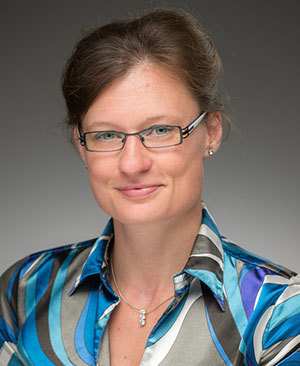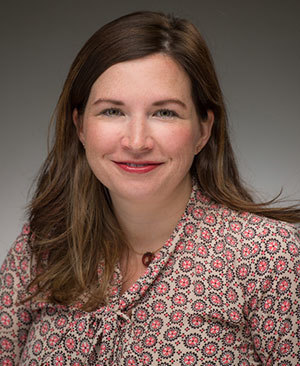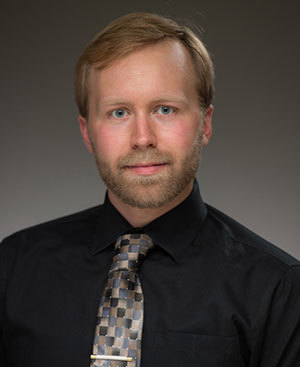Notre Dame’s Department of Economics added expertise in education, energy, sovereign debt, and consumer market behavior with the appointments this fall of four new faculty members.
The fast-growing department is continually looking to add faculty who best fit with its mission and the University’s mission, said William Evans, the Keough-Hesburgh Professor of Economics and chair of the department, which often leads to new hires with varying research and teaching interests.
That’s exactly the case with new assistant professors Christiane Baumeister, Chloe Gibbs, and Zachary Stangebye and assistant teaching professor Forrest Spence.
“The academic market in economics is very strong, and recruiting is the hardest aspect of building a department—the candidates you want always have a lot of good options,” Evans said. “In all four of these situations, we were able to successfully attract candidates away from very good options. We feel very fortunate to have them in our department.”
Christiane Baumeister
 Christiane Baumeister
Christiane Baumeister
Baumeister, previously a senior analyst and principal researcher in the Bank of Canada’s International Economic Analysis Department, is an empirical macroeconomist with an interest in monetary economics and oil markets. She studies what factors cause oil price fluctuations markets and how to best forecast where oil prices are headed.
A frequently cited young scholar that Evans describes as an “up-and-coming star in the field,” Baumeister has also researched the U.S. Federal Reserve’s measures to pull the economy out of the late-2000s recession.
“It was a highly unusual situation. There was a lot of uncertainty in the policies devised at the time. If we end up in this situation again, we hope to know if our leaders should use these policies again,” Baumeister said. “Our leaders of tomorrow are of course our students – be it in business or policy-making institutions – so I am excited to prepare them for those challenges by bringing some of my real-world experience to the classroom.”
She adds that she approaches her work from an applied perspective, with a goal of providing sound empirical analysis to decision-makers.
“I want to have a real-world impact,” Baumeister said. “My goal is to help people make decisions that matter.”
Chloe Gibbs
 Chloe Gibbs
Chloe Gibbs
Gibbs, who joins the department from the University of Virginia, focuses her work on the economic impacts of education policies, specifically the long-term effects of early childhood education.
She analyzes data to understand how programs such as Head Start, targeted toward low-income families, affect high school graduation rates, admission to college, or earnings.
“One of the sobering facts that we know is that when kids arrive at pre-K and kindergarten, there are some pretty significant gaps in reading, math and behavioral skills based on income,” Gibbs said. “I’m interested in how investments in education and policies affect kids who participate in them, as well as the effects on parents, families and society more broadly.
“It’s an area where we can make investments that could have big returns, and we need to understand how those policies would work.”
A Notre Dame alumna who majored in government and international studies, Gibbs’ work on the economics of education blends well with other department initiatives that seek to improve social systems through research, Evans said, such as the Wilson Sheehan Lab for Economic Opportunities.
Gibbs said she looks forward to joining a collegial group of academics who are supportive and encouraging of one another’s research pursuits.
“There are excellent opportunities to get feedback and mentorship here,” she said.
Zachary Stangebye
 Zachary Stangebye
Zachary Stangebye
An international macroeconomist, Stangebye received his Ph.D. in economics this year from the University of Pennsylvania.
He has studied the recent debt crisis striking many members of the European Union and past financial crises in Latin America to understand how lending to sovereign entities can affect those economies.
“In 10 years’ time, this will be a top department, and I want to be a part of that,” Stangebye said. “There is a lot of potential for growth here as we become more and more known by the broader economic and academic community.”
The department was also appealing because of its unique opportunities for new faculty members to establish research programs, he said.
“There is a big pool of resources here that isn’t easy to find at other major research universities,” Stangebye said. “There are people I can talk to who understand international economics, but I am able to carve out my own niche.”
Forrest Spence
 Forrest Spence
Forrest Spence
Spence comes to the department as a full-time teacher after receiving his Ph.D. from the University of North Carolina.
Spence has studied interactions between consumers and businesses, specifically the ways in which consumers learn about the characteristics of markets and how that affects businesses’ practices and consumer habits.
“Forrest had a wonderful teaching record from his graduate student days, so we are excited about him being part of the department,” Evans said. “In the next few years, we expect him to be a big part of the introductory and intermediate microeconomics classes at the undergraduate level.”
Spence said he long wanted to teach economics, and the welcoming faculty at Notre Dame made coming here a perfect opportunity.
“There are a ton of resources here if I want to do research, but by taking this job, I can really focus on teaching,” Spence said. “It was a great fit based on my professional goals.”
Originally published by at al.nd.edu on January 11, 2016.